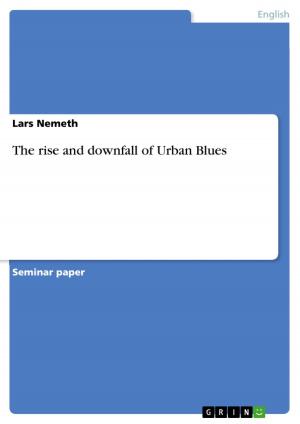| Author: | Silke-Katrin Kunze | ISBN: | 9783638126038 |
| Publisher: | GRIN Publishing | Publication: | May 13, 2002 |
| Imprint: | GRIN Publishing | Language: | English |
| Author: | Silke-Katrin Kunze |
| ISBN: | 9783638126038 |
| Publisher: | GRIN Publishing |
| Publication: | May 13, 2002 |
| Imprint: | GRIN Publishing |
| Language: | English |
Seminar paper from the year 2001 in the subject English Language and Literature Studies - Linguistics, grade: 2 (B), Dresden Technical University (Anglistics/ American Studies), course: Seminar: Varieties of Canadian English, 9 entries in the bibliography, language: English, abstract: Canada and Quebec With ten million square kilometers Canada is the world's largest country. It consists of ten provinces and two territories, each having its own character due to the landscape and people who settled there. Just to name a few, there is the Prince Edward Island (P. E. I.), for instance, the smallest of all ten provinces. Farming is most important for the economy of the region, but fishing also helps. Attracted tourists can reach the sandy beaches by ferry to enjoy a quiet atmosphere. Or, there are three prairie provinces. At the end of the 19th century they were settled by immigrants of German, Scandinavian and Ukrainian origin. Saskatchewan is one of them. Lying in the center, it is home to the 'Mounties,' the Royal Canadian Mounted Police. Canada is a country with two official languages, English and French. Every public service has to be offered in both languages, which is why sales people welcome their shoppers by saying 'Hello / Bonjour,' and which is why a third province needs mentioning here: Quebec, the largest of all Canadian provinces. It is very different from the rest because of a high French influence. Economically important for this region are hydroelectric power, logging, and manufacturing. Quebec's commercial center is formed by Montreal. It is not only the second largest French-speaking city in the world, it also offers a wide range of cultural activities. However, there is more to Quebec than these rather late developments. Already 300 years ago the problem between the English and French originated. Reasons can be found in two facts. One, in 1608 the Frenchman Samuel de Champlain was the first to start a settlement in Quebec. Two, after the English and French colonies had grown and battles had begun, the Seven Years' War was fought in 1763. The French lost and had to give nearly all their territory to the British. That was the so-called Treaty of Paris. Thus, French power actually ended then. People have their own way of life, though. They simply kept the French language, their Roman Catholic faith, and a civil code that had its origins in French laws. [...]
Seminar paper from the year 2001 in the subject English Language and Literature Studies - Linguistics, grade: 2 (B), Dresden Technical University (Anglistics/ American Studies), course: Seminar: Varieties of Canadian English, 9 entries in the bibliography, language: English, abstract: Canada and Quebec With ten million square kilometers Canada is the world's largest country. It consists of ten provinces and two territories, each having its own character due to the landscape and people who settled there. Just to name a few, there is the Prince Edward Island (P. E. I.), for instance, the smallest of all ten provinces. Farming is most important for the economy of the region, but fishing also helps. Attracted tourists can reach the sandy beaches by ferry to enjoy a quiet atmosphere. Or, there are three prairie provinces. At the end of the 19th century they were settled by immigrants of German, Scandinavian and Ukrainian origin. Saskatchewan is one of them. Lying in the center, it is home to the 'Mounties,' the Royal Canadian Mounted Police. Canada is a country with two official languages, English and French. Every public service has to be offered in both languages, which is why sales people welcome their shoppers by saying 'Hello / Bonjour,' and which is why a third province needs mentioning here: Quebec, the largest of all Canadian provinces. It is very different from the rest because of a high French influence. Economically important for this region are hydroelectric power, logging, and manufacturing. Quebec's commercial center is formed by Montreal. It is not only the second largest French-speaking city in the world, it also offers a wide range of cultural activities. However, there is more to Quebec than these rather late developments. Already 300 years ago the problem between the English and French originated. Reasons can be found in two facts. One, in 1608 the Frenchman Samuel de Champlain was the first to start a settlement in Quebec. Two, after the English and French colonies had grown and battles had begun, the Seven Years' War was fought in 1763. The French lost and had to give nearly all their territory to the British. That was the so-called Treaty of Paris. Thus, French power actually ended then. People have their own way of life, though. They simply kept the French language, their Roman Catholic faith, and a civil code that had its origins in French laws. [...]















